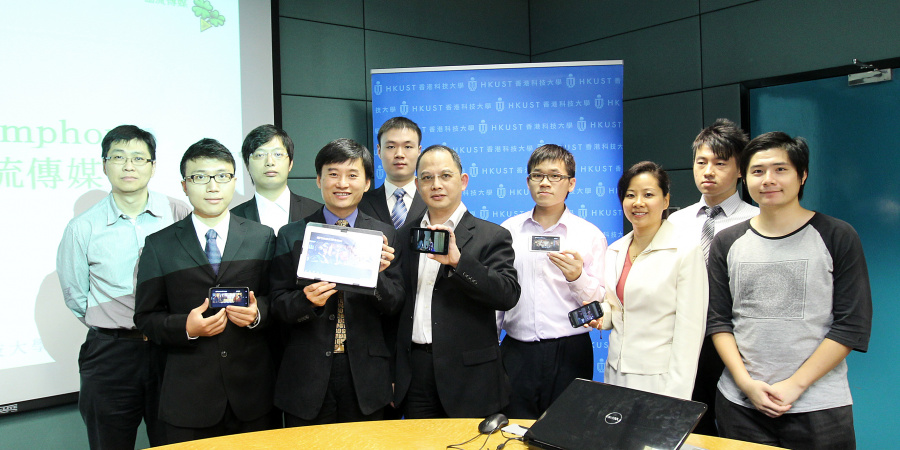HKUST Develops Next-generation Streaming Cloud For High-quality Multimedia Broadcasting
A research team from the Hong Kong University of Science and Technology (HKUST) has developed a next-generation streaming cloud for large-scale high bitrate applications over the global Internet. The cloud, named Streamphony, is well acclaimed by both content and service providers and is currently being adopted by industry leader Mei Ah Digital Technology Limited and a major telecommunication company for high-quality live broadcasts planned in December this year.
Existing Internet broadcasting technologies suffer from a number of constraints, including low visual quality, prolonged delays, high costs and limited system scalability. A research team led by Prof Gary Chan, Associate Professor of the Department of Computer Science and Engineering makes use of innovative streaming technologies to push high-quality contents to distributed viewers. It achieves high-quality multimedia broadcasting with significant cost savings of 70% on bandwidth and 30% on hardware.
Using a distributed and self-optimizing protocol, Streamphony achieves system scalability to virtually unlimited number of users. Its patented technology is highly adaptive to network environment to attain the best performance. “Many unique and innovative features in Streamphony account for its high efficiency and low deployment cost. Streamphony divides the multimedia stream into multiple 'sub-streams' and intelligently 'pushes' them over multiple paths in the cloud. This new design paradigm is a quantum leap from the traditional design, leading to its remarkably low delay. It also enables the integration of IP multicast to substantially cut down network traffic and cost,” Prof Chan explained.
Streamphony is the culmination of years of industry-driven research and advanced development. It defines a new era for content distribution network. Mr Steve Law, Executive Director of Mei Ah Digital Technology Limited elaborated, “When searching for suitable technology for our Content Distribution Network (CDN) to stream multimedia, we looked for next-generation technology which not only can deliver our contents in high quality and low cost, but also is expandable and flexible enough to support network growth, heterogeneous device types, and new features such as 7.1 audio effect, adaptive bitrates and 3D animation. Streamphony fits our goals with its innovative approaches. We look forward to closely collaborating with Prof Chan's team in our forthcoming deployment starting in Hong Kong, followed by the Mainland and then the rest of the world.”
Prof Khaled Ben Lataief, Dean of HKUST School of Engineering and Chair Professor of Department of Electronic and Computer Engineering, said, “Addressing industrial challenges and needs has always been one of the research missions of the school. We are very excited that Prof Chan has successfully demonstrated his research excellence and impact by developing industrial solutions which advance the field.” Prof Mounir Hamdi, Head and Chair Professor of Department of Computer Science and Engineering, added, “Prof Chan has been fruitful in the research area for years, and his work has been highly valued by industry. He has made notable contributions to Hong Kong's technological advancement.”
The research and development of Streamphony was commenced with the support of HKUST, government and industry. The Technology Transfer Center of HKUST has offered seed funding and advice on its licensing contracts and technology transfer. The Innovation and Technology Commission (ITC) and industry have provided funding and trial sites. Through innovative applied research with feedback from actual implementation, the team has accomplished numerous trials under real deployment scenarios to successfully bring Streamphony to its commercialization.

